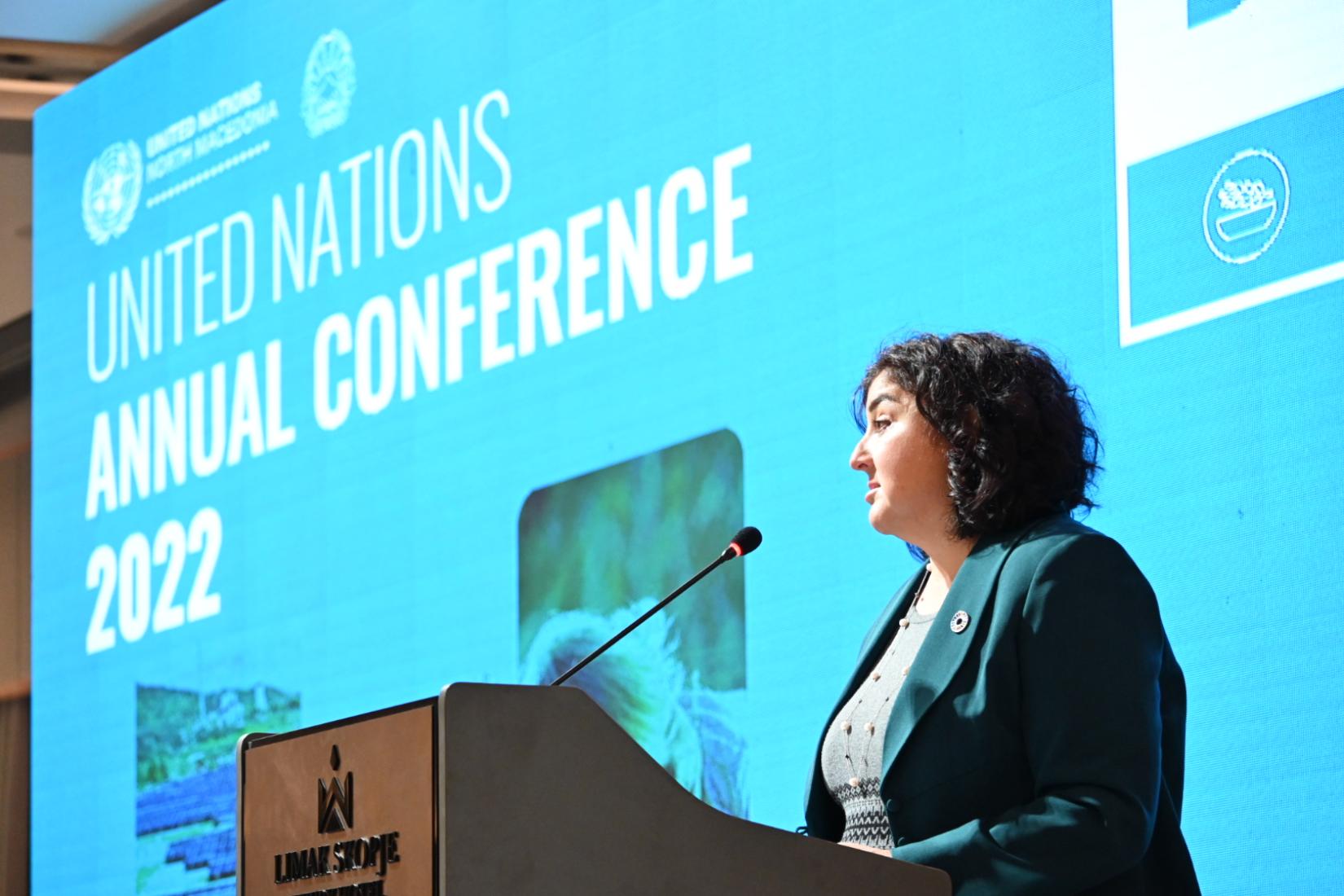Systematic solutions as an answer to the global food and energy crisis
21 December 2022
The United Nations annual conference, this time entitled as "Look further" was held today in Skopje.

Skopje, December 21, 2022. - At the conference entitled "Look further", which was held today in Skopje in the organization of the United Nations, representatives of several UN agencies together with international experts and representatives of the government discussed the key measures that the Republic of North Macedonia is taking and should take plans in the future in order to overcome the challenges in the food and energy crisis.
"The current crisis is in many ways unprecedented. However, the root causes and drivers are neither new nor surprising and reflect our inability to prioritize the advancement of the Sustainable Development Goals. Policy solutions are complex. We need to respond to the immediate needs to lift people out of poverty, but we also need to support businesses in order to save jobs, with concrete measures to ensure the best possible results with the available resources. Most importantly, policies should be systemic, sustainable and visionary to ensure that, despite the challenges, we remain strongly focused on sustainable growth and development. That requires timely and accurate data, cooperation and coordination," said the UN Resident Coordinator, Rossana Dudziak, at the opening of the conference.
During the panel, the Vice Prime Minister for Economic Affairs, Fatmir Bytyqi, emphasized that the problems should be solved systematically. "If they are not solved systematically, the problems increase. For example, we have been talking about digitization for years, but it was only superficial and not essential. Digitization requires a fundamental change in the behavior of stakeholders and citizens. We have not entered any segment to solve the problem in the way we should solve it", says Bytyqi. "Regarding the energy crisis, we understand that production is important, but we knew that we are 35 percent dependent on energy imports. It was nice because the price was good. As soon as a crisis comes, everyone asks why the problem is not solved. That problem is not solved overnight. The problem is again systemic. It should have started to be solved 10 years ago, and that in the field of alternative energies. Green energy. We are now trying to get old timers back into traffic with little intervention. But that is not a solution. The solution is green energy, a transition to green energy," added the Deputy Prime Minister for Economic Affairs.
The deputy representative of UNICEF, Artur Ayvazov, pointed out that shocks from price growth disproportionately affect households with more children and poorer families, due to their lower incomes and the greater share of food and energy consumption in their household budgets. Rising food prices leave these families with very little means to meet other basic needs. Ayvazov indicated that the Government should consider additional measures to reduce the burden on children and other vulnerable groups, including by expanding the access and volume of existing cash transfers and to ensure that the budget crisis does not disrupt basic health care services. , social protection and education.
Addressing the conference, the Deputy Regional Representative of FAO for Europe and Central Asia, Nabil Gangi, emphasized that from a long-term perspective, it is important to consider the structural causes of the food crisis, and in order to have a better approach to solving this problem, distinguishes between issues affecting access to food and issues affecting food availability. In terms of access to food, the situation is multidimensional and reflects the complex interrelationship between food, energy and financial crises. According to Gangi, addressing food security challenges caused by current crises requires an "agri-food systems" approach, which FAO promotes to act outside the usual sectoral frameworks. It is a systematic combination of policies, investments and solutions focused on sustainable improvements in productivity and efficiency, greater resilience and ensuring enough healthy food for all.
"Empirical research shows that a well-developed financial system can increase growth by up to 1 percent, and more importantly, reduce poverty. Financial systems contribute to encouraging savings and channeling them into investments, which are important for increasing the volume of capital and productivity, which in turn are the main determinants of long-term growth," said the Governor of National Bank of the Republic of North Macedonia, Anita Angelovska - Bezhoska. "The importance of finance is especially great in these crisis circumstances that emphasize structural weaknesses and the need for a green and digital transformation of the economy. It is positive for us that credit support for green transformation is growing, i.e. loans for this purpose in the past three years have recorded an increase of 80%", says Angelovska - Bezhoska.
According to the Permanent Representative of the UNDP, Armen Grigoryan, the crisis will probably continue in 2023 and it is difficult to predict in which direction things will develop. "UNDP and other UN agencies in the country, together with other development partners, are here to support institutions and citizens and contribute to public dialogue and consensus building around specific policies and other measures that will contribute to addressing current development challenges and the impact of the global crisis. However, we now have a better understanding of the vulnerabilities and root causes of the crisis, internal and external factors, and propose systemic pathways in response to the crisis. One of the things that should be paid attention to is the gray economy, which, according to research, amounts to somewhere around 35 percent entering the system, to pay taxes. The second thing is the encouragement of small and medium-sized enterprises and regional cooperation," Grigoryan said.
The Minister of Finance, Fatmir Besimi, emphasized that the past three years, which have been marked by crisis, have moved the mid-term framework of the planned fiscal targets, aimed at the consolidation of public finances and their long-term sustainability. "But at the same time, the policy makers give us the opportunity and show us where in the system we need changes. That's why we think it's good to implement the reform agenda in crisis episodes."
He added that this year, contrary to expectations, was not a year suitable for fiscal consolidation, and there was a need for measures to support citizens, the economy and for greater production of electricity from domestic capacities to deal with the energy and price crisis.
"In these conditions, the Government successfully resorted to rationalization of the expenditure side of the Budget, with which the achieved deficit is largely kept within the framework of the fiscal targets, which by 2027 should be reduced to 2.8% of the GDP budget deficit and public debt below 60%", said Besimi.
The goal of the United Nations agencies, UNDP, FAO and UNICEF, together with national and international partners, is to find sustainable and long-term solutions that will respond to the needs of vulnerable groups and at the same time support growth and development, in conditions of high inflation. and modest financial resources.


















